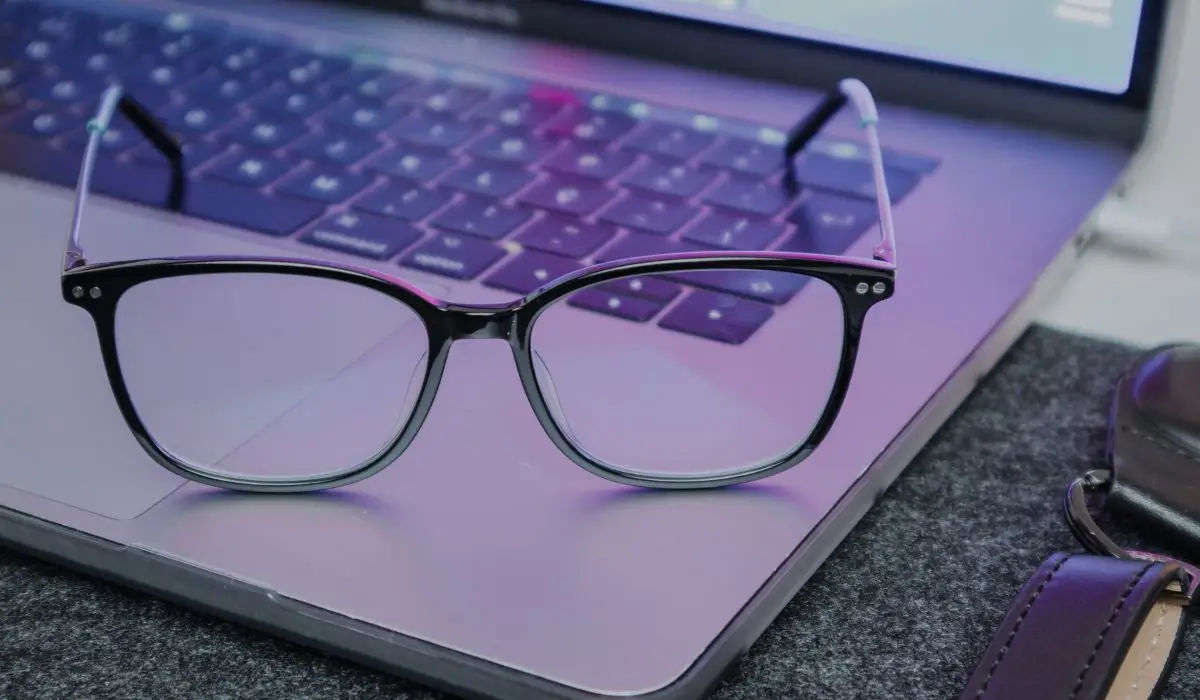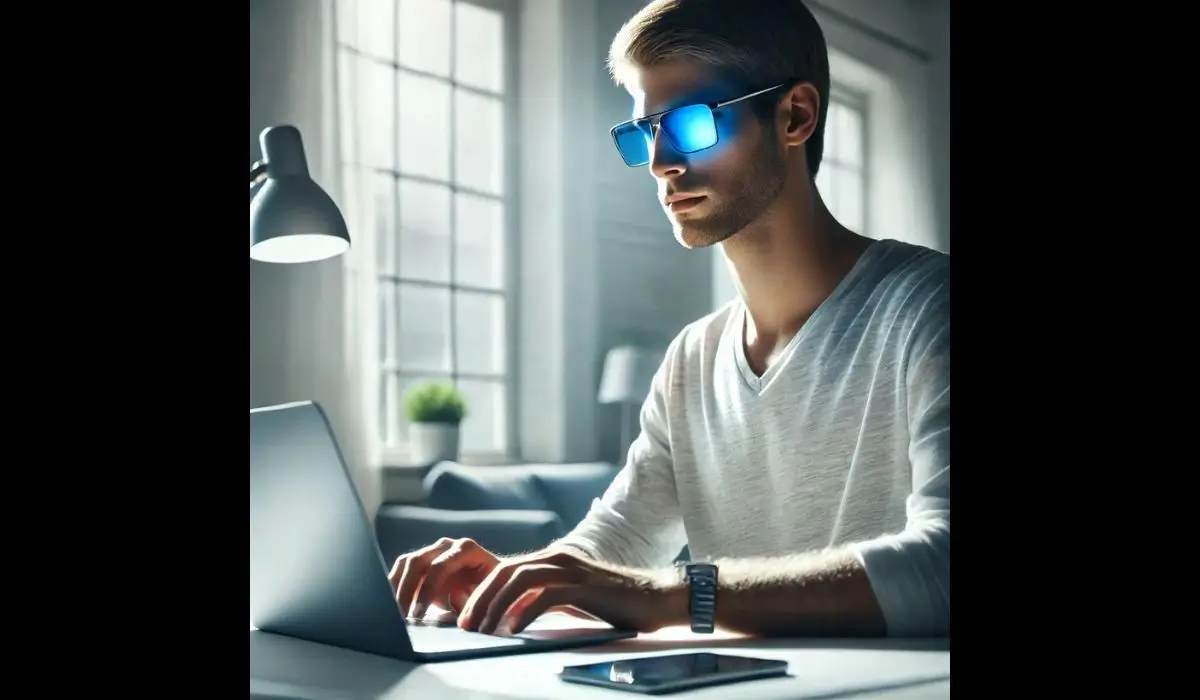
The Best Blue Light Glasses for Digital Device Users
Choosing The Best Blue Light Glasses For Digital Device Users
With the increasing amount of time we spend in front of screens, concerns about digital eye strain have become more common than ever. Studies show that the average adult spends over 7 hours per day on digital devices, contributing to the growing issue. Whether it’s working on a computer, browsing on a smartphone, or watching TV, prolonged screen time can lead to discomfort, with nearly 60% of Americans reporting symptoms like headaches, dry eyes, and blurred vision.
A simple and effective solution many turn to is blue light glasses. These glasses help filter out harmful blue light emitted by digital devices, reducing eye strain by as much as 58% and supporting long-term eye health. But how do you choose the best pair of these glasses, and are they really as beneficial as they claim to be?
DeCarlo Optometry has seen firsthand the difference these glasses can make for patients, with many reporting significant relief from symptoms after consistent use. In this article, we’ll guide you through what to look for when selecting blue light glasses, when to seek optometrist advice, and how these glasses can help protect your vision from overexposure to blue light. If you’re considering getting a pair, be sure to explore our services or schedule an appointment to discuss your options.
Are Blue Light Glasses Good For Computer Use?
Digital screens emit blue light, a high-energy visible light, which can contribute to digital eye strain, also known as computer vision syndrome. Long periods of time spent in front of a computer expose our eyes to an unnatural level of blue light, which can cause discomfort and even long-term damage like macular degeneration.
Blue light glasses offer a simple solution for reducing these risks. These glasses, which filter out harmful blue light, can relieve eye strain, improve focus, and reduce headaches. Several studies, including those reviewed by optometrists, support the use of these glasses, showing a noticeable improvement in reducing digital eye strain.
How Do I Choose The Best Blue Light Glasses?
When selecting blue light glasses, there are several factors to consider to ensure you get the best protection and comfort. Here’s what to look for:
1. Lens Quality
High-quality lenses are essential for effective blue light filtering. Look for glasses that can filter at least 20-30% of blue light for casual users, and up to 90% for those who work long hours in front of a screen.
2. Blue Light Filtering Percentage
The higher the filtering percentage, the better protection you’ll get from screen time exposure. Some glasses even come with UV protection, which is a great bonus for outdoor use.
3. Anti-Glare Coatings
Reflections from digital screens can add to eye strain. Many blue light glasses come with anti-glare coatings to reduce these reflections, making the screen easier to look at for extended periods.
4. Fit and Comfort
Since you’ll be wearing these glasses for hours, the fit is crucial. Glasses that are too tight can cause headaches, while those that are too loose may slip off. Try to find a pair that suits your face shape and is comfortable for long use.
Can I Use Blue Light Glasses For My Phone?
Smartphones, tablets, and other digital devices. Smartphones deliver light through Light Emitting Diode (LED) displays, which emit a significant amount of blue light. Studies have shown that blue light is the most potent wavelength for affecting sleep and mood. A recent study found that using blue light-emitting smartphones at night can negatively influence sleep patterns by delaying the onset of melatonin production and increasing body temperature and cortisol levels. This delay in melatonin can make it harder to fall asleep, contributing to overall fatigue.
The same study showed that participants using smartphones with conventional blue light LED displays experienced significantly decreased sleepiness and increased commission errors when compared to those using devices with blue light suppression. Over time, these effects can lead to more digital eye strain, sleep disturbances, and confusion.
Optometrists often recommend blue light glasses for people who frequently switch between screens throughout the day. These glasses can protect your eyes no matter what device you’re using, ensuring consistent screen time protection across all platforms.
What Color Glasses Are Best For Computer Use?
Selecting the right blue light glasses starts with understanding the blue light lens color guide. Different lens colors offer varying levels of blue light protection, tailored to your screen usage during the day and night.
Clear Lenses
Clear lenses are ideal for daytime use and filter 50% of blue light, specifically at 455 nm, the wavelength most commonly emitted by screens. They help reduce digital eye strain, headaches, and fatigue while allowing beneficial blue light to pass through. These lenses provide minimal color distortion, making them perfect for office work and general daytime use.
Yellow Lenses
Yellow lenses provide maximum daytime protection by blocking 100% of blue light in the 400-455 nm range, which can help with migraines, light sensitivity, and eye strain. They are especially useful in environments with excessive LED or fluorescent lighting. For those highly sensitive to light, yellow lenses offer more protection than clear lenses without distorting colors too much.
Amber Lenses
Amber lenses are best suited for night-time use, blocking 100% of blue light to promote melatonin production and improve sleep quality. They reduce sleep disruption caused by late-night screen use, helping your body wind down for the evening. These lenses are ideal for evening use when artificial lighting from screens can interfere with natural sleep cycles.
Red Lenses
Red lenses offer the most powerful protection, blocking 100% of both blue and green light up to 550 nm, which helps optimize sleep. Studies show that green light can also disrupt melatonin production, making red lenses the best choice for those serious about enhancing sleep quality. These lenses are perfect for night-time use and those looking to maximize rest and recovery.


What Are The Disadvantages Of Blue Light Glasses?
While blue light glasses can be highly effective in reducing eye strain, they are not without potential drawbacks. Here are a few things to keep in mind:
Color Distortion
Some blue light glasses, particularly those with tinted lenses, may slightly alter how colors appear on the screen, which can be distracting for users who require accurate color representation.
Discomfort
Like any eyewear, poorly fitting blue light glasses can cause discomfort, especially when worn for extended periods. Be sure to choose glasses that fit your face properly to avoid headaches or pressure around the temples.
Effectiveness
While many users report a reduction in digital eye strain, some studies have shown mixed results. Not all users will experience the same benefits, and the level of blue light blocking varies between products. Additionally, these are not a complete solution for all eye issues, such as headaches caused by eye misalignment.
It’s important to combine the use of blue light glasses with other eye care strategies. For instance, follow the 20-20-20 rule: every 20 minutes, look at something 20 feet away for 20 seconds to give your eyes a break from the screen. For those unsure about the impact of blue light glasses, consult with an optometrist to explore alternative treatments.
Protect Your Vision With The Right Blue Light Glasses
Blue light glasses have proven to be a valuable tool for reducing digital eye strain and protecting your eyes from the long-term effects of extended screen time. By filtering harmful blue light, these glasses can help ease eye discomfort, improve focus, and support overall eye health.
When choosing the best pair, consider lens quality, comfort, and the level of blue light filtering needed based on your screen usage. To ensure you get the perfect fit and protection, it’s always best to seek professional optometrist advice.
Dr. Robert DeCarlo has been a leading optometrist for over 30 years, providing top-level eye care since 1989. He specializes in managing computer vision syndrome, keratoconus, and dry eye conditions, offering expert advice on blue light protection and eye health. DeCarlo Optometry ensures every patient receives personalized care, whether they need blue light glasses or advanced treatments like scleral lenses for corneal diseases.
At DeCarlo Optometry, we offer personalized recommendations for blue light glasses, ensuring you get the right pair for your needs. Visit our FAQ page for more information or fill out our new patient form to schedule a consultation. You can also schedule an appointment or call us at (714) 996-1136 to learn more about protecting your eyes in this digital world.
